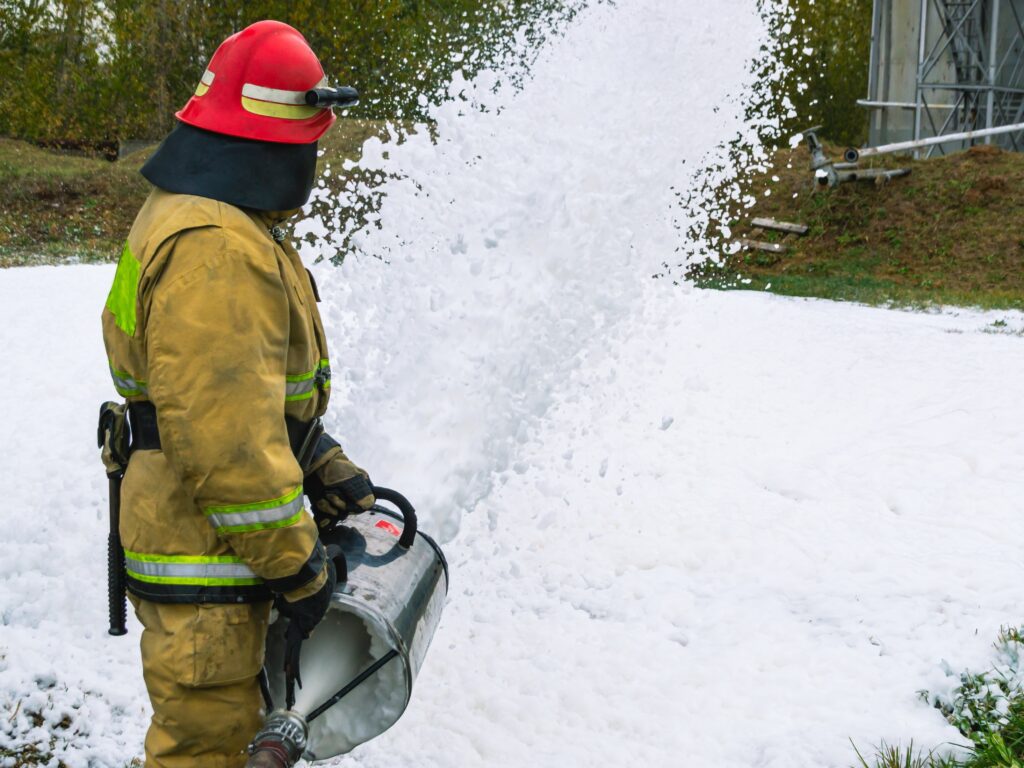
Aqueous film forming foam (AFFF), a type of firefighting foam which contains chemicals linked to cancer, has been banned in Illinois and Connecticut.
The PFAS Reduction Act was passed unanimously by Illinois’ legislature on August 6, 2021, and Connecticut’s Public Act 21-191 takes effect on October 1, 2021.
PFAS, including perfluorooctanoic acid (PFOA), have been linked with numerous types of cancer in animal studies, including testicular, liver and pancreatic cancer.
It must be assumed that any chemical which causes cancer in animals may cause cancer in humans if the mechanism of action behind it causing cancer in animals is not known. There is no known mechanism of action behind PFAS causing cancer in animals.
PFAS are sometimes referred to as “forever chemicals” because they persist indefinitely in the environment without breaking down. PFAS are primarily composed of carbon atoms bonded to fluorine atoms, and the carbon-fluorine bond is one of the strongest bonds between atoms which is found in nature.
Firefighting foam lawsuits have been filed all across the country on behalf of those who have developed cancer after being exposed to AFFF. The firefighting foam lawyers at Nadrich Accident Injury Lawyers provide free consultations to anyone who has developed cancer after being exposed to AFFF.
PFAS Reduction Act
Illinois’ PFAS Reduction Act bans the manufacture, sale and distribution of firefighting foam which contains per- and polyfluoroalkyl substances (PFAS), toxic chemicals which have been linked to cancer. The bill also establishes warning requirements for AFFF manufacturers, sets fines for violators, and establishes environmental release obligations regarding releases of AFFF onto land or into state waterways.
The manufacture, sale and distribution of AFFF containing PFAS will be banned in Illinois as of January 1, 2025. The use of AFFF containing PFAS for training and testing will be banned in Illinois as of January 1, 2022, except under the following circumstances:
- Trainers/testers must asses the testing site for disposal, treatment and control options
- Trainers/testers must follow Illinois notification requirements
- Trainers/testers must train workers on product hazards and protective measures during use and cleanup of AFFF
The bill also requires that AFFF manufacturers give fire departments warnings prior to the sale of AFFF containing PFAS, warning that the products may pose a health hazard, that the product’s use is restricted and regulated, and that other products may be available for purchase as an alternative.
The bill requires that, as of January 1, 2022, any release of AFFF containing PFAS must be reported to the state within 48 hours. The report must contain the reason for, time of, date of, location of and quantity of the release, as well as proposed disposal, treatment and containment steps. The release of AFFF into waterways, storm drains, sewers or ditches will be prohibited.
The bill establishes fines of up to $5,000 for the first violation and up to $10,000 for subsequent violations of any of the above provisions.
Public Act 21-191
Under Connecticut’s Public Act 21-191, the use of firefighting foam containing PFAS will not be permitted for vapor suppression, testing activities or training activity use, and the use of PFAS in food packaging will be phased out by 2023. All firefighting foams in Connecticut, as of October 2, 2021, must be PFAS-free.
The law allows for extensions for AFFF use to be requested under the following exemptions:
- Airport-related entities with facilities that use fire suppression systems containing AFFF
- Anyone required by federal law to use AFFF
- Anyone who operates a chemical plant, oil refinery, terminal, storage, or distribution facility for flammable liquids
Any extension requests must say why the extension is needed and what disposal, treatment and containment measures will be put in place to prevent the release of AFFF into the environment.

